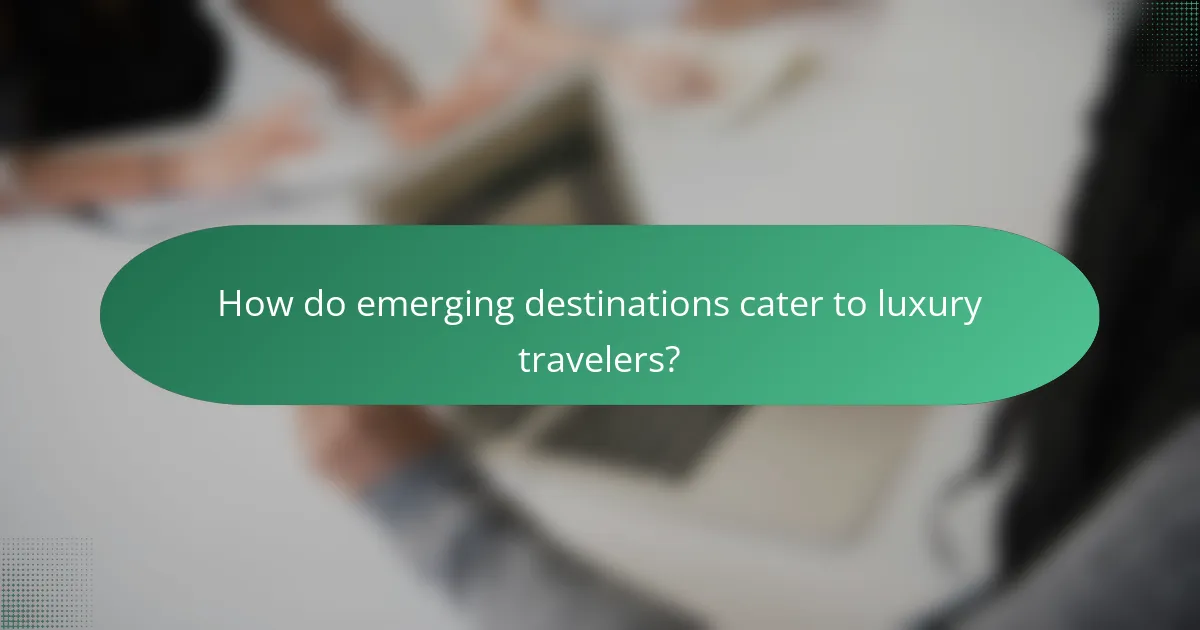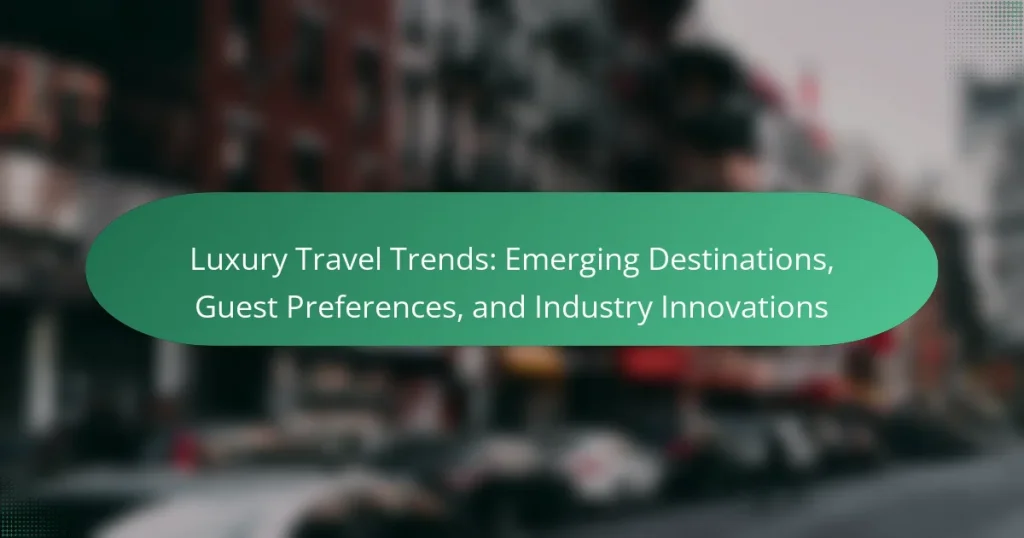Luxury travel trends are evolving, focusing on personalized experiences, sustainable practices, and wellness offerings. Current preferences among luxury travelers include unique, tailor-made itineraries and eco-friendly accommodations, with a significant percentage prioritizing sustainability in their travel choices. Emerging destinations are gaining traction, providing high-end accommodations and authentic local experiences, while technology integration, such as AI and virtual reality, enhances the travel planning process. The article explores these trends, highlighting the shift towards meaningful and responsible travel experiences, as well as the growing demand for bespoke services in the luxury travel sector.

What are the current luxury travel trends shaping the industry?
Current luxury travel trends include personalized experiences, sustainable travel, and wellness-focused offerings. Personalized experiences cater to individual preferences, enhancing guest satisfaction. Sustainable travel emphasizes eco-friendly practices, with 72% of luxury travelers prioritizing sustainability in their choices. Wellness-focused offerings are on the rise, with luxury resorts integrating health and wellness programs. Additionally, remote and off-the-beaten-path destinations are gaining popularity as travelers seek unique experiences. Technology integration, such as virtual reality and AI, is also shaping the luxury travel landscape. These trends reflect a shift towards more meaningful and responsible travel experiences.
How are emerging destinations influencing luxury travel?
Emerging destinations are reshaping luxury travel by offering unique experiences and exclusivity. These locations often provide untapped natural beauty and cultural richness. Travelers seek authenticity that established luxury spots may lack. Increased accessibility through improved infrastructure makes these destinations more appealing. The rise of social media amplifies visibility for these locations, enticing luxury travelers. According to a report by Virtuoso, 60% of luxury travelers are interested in visiting new and lesser-known destinations. This trend is driving luxury brands to innovate and tailor offerings to meet evolving guest preferences.
What factors contribute to the rise of new luxury travel destinations?
The rise of new luxury travel destinations is influenced by several key factors. Increasing disposable income allows more travelers to seek luxury experiences. Social media exposure creates trends and highlights unique locations. Demand for personalized experiences drives the development of exclusive offerings. Sustainable tourism practices attract eco-conscious travelers to new areas. Emerging markets are seeing a growth in affluent travelers seeking unique luxury experiences. Infrastructure improvements make previously inaccessible locations viable for luxury travel. Cultural authenticity appeals to travelers looking for unique local experiences. Finally, the influence of luxury brands expands interest in new destinations.
Which regions are becoming popular among luxury travelers?
Regions becoming popular among luxury travelers include Southeast Asia, particularly Thailand and Vietnam. These destinations offer unique cultural experiences and luxurious accommodations. The Maldives remains a top choice for its exclusive resorts and stunning beaches. Europe is also gaining traction, with destinations like Italy and Greece attracting affluent visitors. The Caribbean, especially islands like St. Barts and the Bahamas, is favored for its privacy and luxury amenities. According to a recent report by Virtuoso, luxury travel bookings to these regions have increased by over 20% in the past year.
What are the evolving guest preferences in luxury travel?
Evolving guest preferences in luxury travel focus on personalized experiences and sustainability. Travelers now seek unique, tailored itineraries that reflect their individual interests. Wellness and health-oriented amenities are increasingly prioritized, with guests looking for spa services and fitness options. Authentic local experiences, such as cultural immersions and culinary adventures, are highly valued. Additionally, eco-friendly accommodations and practices are becoming essential for many luxury travelers. According to a 2022 report by Virtuoso, 87% of luxury travelers consider sustainability when choosing a travel destination. This shift indicates a broader trend towards responsible tourism within the luxury sector.
How do luxury travelers prioritize experiences over material goods?
Luxury travelers prioritize experiences over material goods by seeking unique and memorable adventures. They value immersive activities that create lasting memories. This trend reflects a shift in consumer behavior towards experiential luxury. Research shows that 78% of affluent travelers prefer experiences over possessions. Experiences foster deeper connections and personal growth. Luxury travelers often invest in exclusive events, cultural experiences, and personalized services. This focus enhances their overall travel satisfaction and well-being. The preference for experiences aligns with the growing trend of wellness and mindfulness in travel.
What role does personalization play in luxury travel preferences?
Personalization plays a crucial role in luxury travel preferences. It enhances the overall travel experience by tailoring services to individual needs. High-end travelers often seek unique and customized experiences. Personalization can include bespoke itineraries, personalized concierge services, and curated activities. According to a study by the Luxury Travel Institute, 70% of luxury travelers prefer experiences tailored to their preferences. This trend indicates a shift towards individualized service in the luxury sector. Furthermore, personalization fosters customer loyalty and satisfaction. Satisfied travelers are more likely to share their experiences and return for future trips.
What innovations are transforming the luxury travel industry?
Innovations transforming the luxury travel industry include personalized travel experiences, advanced technology integration, and sustainable practices. Personalized travel experiences use data analytics to tailor itineraries to individual preferences. Advanced technology integration features tools like virtual reality for destination previews and AI for customer service. Sustainable practices focus on eco-friendly accommodations and carbon offset programs. According to a 2022 report by the World Travel & Tourism Council, 70% of luxury travelers prioritize sustainability in their travel choices. These trends reflect a shift towards more customized, tech-savvy, and environmentally conscious travel options.
How is technology enhancing the luxury travel experience?
Technology is enhancing the luxury travel experience by providing personalized services and seamless convenience. Smart devices enable travelers to customize their itineraries in real-time. Mobile apps allow for easy booking and check-in processes. Virtual reality offers immersive previews of destinations and accommodations. Artificial intelligence assists in tailoring recommendations based on individual preferences. High-speed internet ensures connectivity for work and leisure while traveling. Contactless payment systems enhance security and efficiency during transactions. Data analytics help luxury brands understand customer behavior and improve service offerings. These advancements collectively create a more enjoyable and tailored travel experience for luxury travelers.
What sustainable practices are being adopted in luxury travel?
Luxury travel is increasingly adopting sustainable practices to minimize environmental impact. High-end resorts are implementing eco-friendly building materials and energy-efficient technologies. Many luxury brands are focusing on sourcing local and organic food to reduce carbon footprints. Water conservation measures, such as rainwater harvesting, are becoming standard in luxury accommodations. Carbon offset programs are being offered to guests to neutralize travel emissions. Luxury cruise lines are investing in cleaner fuel technologies to reduce ocean pollution. Wildlife conservation initiatives are being supported by luxury tour operators, promoting responsible tourism. These practices reflect a growing commitment to sustainability within the luxury travel sector.

How do emerging destinations cater to luxury travelers?
Emerging destinations cater to luxury travelers by offering unique experiences and personalized services. These locations often feature high-end accommodations, such as boutique hotels and luxury resorts. Many emerging destinations emphasize cultural immersion, providing travelers with authentic local experiences. Exclusive access to private tours and unique events is common. Wellness offerings, including spa treatments and wellness retreats, are increasingly available. Additionally, gourmet dining experiences showcasing local cuisine attract discerning travelers. Sustainable practices are often integrated into luxury offerings, appealing to environmentally conscious guests. According to a report by Virtuoso, luxury travelers are seeking off-the-beaten-path experiences, driving demand for these emerging destinations.
What amenities are expected by luxury travelers in new destinations?
Luxury travelers expect high-end amenities in new destinations. These amenities typically include personalized concierge services. They also look for fine dining options featuring local and international cuisines. High-quality spa services with wellness treatments are essential for relaxation. Luxury accommodations often provide spacious rooms with premium bedding. Exclusive access to private tours and experiences enhances their travel. High-speed internet and state-of-the-art technology are expected in accommodations. Additionally, luxury travelers appreciate unique cultural experiences tailored to their interests. According to a 2022 report by the Luxury Travel Association, 78% of luxury travelers prioritize unique and immersive experiences.
How do local cultures influence luxury accommodations?
Local cultures significantly influence luxury accommodations by shaping design, service, and guest experiences. Cultural elements often dictate architectural styles and interior decor. For instance, traditional materials and local craftsmanship are commonly used in high-end hotels. Local cuisine is frequently featured in luxury dining options, reflecting regional flavors and culinary heritage. Additionally, cultural customs influence service practices, enhancing guest interactions. Many luxury brands incorporate local art and cultural events into their offerings, providing authentic experiences. This approach not only attracts guests but also supports local economies. Research shows that travelers increasingly seek culturally immersive experiences in luxury settings.
What unique experiences are offered in emerging luxury destinations?
Emerging luxury destinations offer exclusive experiences that include personalized wellness retreats, immersive cultural experiences, and bespoke culinary adventures. These locations often feature eco-luxury accommodations that blend sustainability with high-end amenities. For instance, travelers can engage in private guided tours of local artisan workshops, enhancing their understanding of regional craftsmanship. Unique adventure activities, such as hot air ballooning over remote landscapes, are also prevalent. Some destinations provide access to untouched natural wonders, allowing for private explorations. High-end wellness programs may incorporate traditional healing practices, tailored to individual needs. Furthermore, luxury travelers often enjoy personalized service, including dedicated concierges who curate unique itineraries. These experiences cater to affluent travelers seeking authenticity and exclusivity in their journeys.
What marketing strategies are effective for promoting new luxury destinations?
Effective marketing strategies for promoting new luxury destinations include targeted digital advertising, influencer partnerships, and experiential marketing. Targeted digital advertising allows brands to reach affluent travelers through platforms like Google and social media. Influencer partnerships leverage the credibility of luxury travel influencers to showcase the destination’s unique offerings. Experiential marketing creates immersive experiences that allow potential travelers to engage with the destination before visiting.
According to a study by the Luxury Marketing Council, 70% of luxury consumers are influenced by social media when making travel decisions. Additionally, 62% of luxury travelers prefer personalized marketing approaches. These statistics highlight the importance of tailoring marketing strategies to the preferences of high-end consumers.
How do social media and influencers impact luxury travel choices?
Social media and influencers significantly impact luxury travel choices. They shape perceptions of destinations and experiences. Influencers showcase exclusive travel experiences to their followers. This creates a sense of aspiration and desire for luxury travel. According to a 2021 study by the Digital Marketing Institute, 49% of consumers rely on influencer recommendations for travel decisions. Social media platforms provide visual content that highlights luxury accommodations and unique experiences. This visual appeal can drive engagement and interest in specific destinations. Additionally, user-generated content enhances authenticity, making luxury travel options more enticing.
What role do travel agencies play in destination promotion?
Travel agencies play a crucial role in destination promotion. They create marketing campaigns that highlight unique attractions. Agencies leverage their networks to reach potential travelers effectively. They also provide expert advice on destinations, enhancing customer confidence. Travel agencies often collaborate with local businesses to offer exclusive packages. This partnership promotes local culture and experiences. Additionally, they utilize social media to showcase destinations visually. Data shows that 70% of travelers rely on agencies for destination insights.

What are the future prospects for luxury travel trends?
The future prospects for luxury travel trends indicate a shift towards personalized experiences and sustainable practices. Travelers increasingly seek unique, tailor-made itineraries that cater to individual preferences. This trend is supported by data showing a 60% rise in demand for bespoke travel services over the past five years. Additionally, luxury travelers are prioritizing eco-friendly options, with 70% expressing a preference for sustainable accommodations. Innovations in technology, such as AI and virtual reality, are enhancing the planning process and enriching travel experiences. These shifts reflect a broader industry movement towards greater customization and environmental responsibility in luxury travel.
How will guest preferences evolve in the coming years?
Guest preferences will evolve towards personalized and sustainable experiences in the coming years. Travelers increasingly seek unique, tailored itineraries that reflect their individual interests. There is a growing demand for eco-friendly accommodations and practices. Research indicates that 70% of travelers prefer brands that prioritize sustainability. Additionally, technology will play a significant role in shaping preferences. Mobile apps and AI will enhance personalization in travel planning. Health and wellness will also become focal points, with guests prioritizing mental and physical well-being during their trips. This shift is supported by the rise of wellness tourism, projected to grow to $919 billion by 2022. Overall, luxury travelers will increasingly value experiences that align with their values and lifestyles.
What new trends are likely to emerge in luxury traveler demographics?
New trends in luxury traveler demographics include a rise in younger affluent travelers, particularly millennials and Gen Z. These groups prioritize experiences over material goods. They seek personalized and immersive travel experiences. Sustainability and eco-consciousness are also becoming important factors in their travel choices. Research indicates that 73% of millennials are willing to pay more for sustainable options. Additionally, there is an increasing interest in wellness travel among luxury consumers. This demographic is also more likely to engage in digital and social media for travel inspiration and planning.
How might economic factors influence luxury travel choices?
Economic factors significantly influence luxury travel choices. Economic stability affects disposable income levels. Higher disposable income leads to increased spending on luxury travel. Conversely, economic downturns may cause travelers to prioritize budget-friendly options. Currency exchange rates can also impact affordability for international luxury travel. Favorable rates encourage travelers to explore high-end experiences abroad. Additionally, inflation can affect the cost of luxury goods and services. As prices rise, travelers may seek more value in their luxury experiences. Economic trends shape consumer confidence, directly influencing travel decisions.
What innovations are expected to shape the future of luxury travel?
Innovations expected to shape the future of luxury travel include advancements in technology, sustainability, and personalized experiences. Smart technology will enhance guest experiences through automation and seamless services. Virtual reality will allow travelers to preview destinations before booking. Sustainable practices will focus on eco-friendly accommodations and carbon offset programs. Personalization will be driven by data analytics, tailoring services to individual preferences. Luxury travel companies are investing in wellness programs to promote health and relaxation. Additionally, exclusive experiences such as private tours and unique accommodations will be prioritized. These trends reflect a shift towards more meaningful and responsible travel.
How will advancements in technology further personalize luxury travel?
Advancements in technology will further personalize luxury travel by enabling tailored experiences through data analytics. Travel companies will utilize customer data to understand preferences better. This information will allow for customized itineraries and services. Artificial intelligence will play a key role in predicting traveler needs. For instance, AI can suggest activities based on past behavior. Virtual reality will enhance pre-travel experiences by allowing clients to explore destinations. Smart devices will facilitate real-time communication and service requests. Furthermore, blockchain technology will ensure secure and personalized transactions. These innovations will create a more seamless and individualized luxury travel experience.
What are the implications of sustainability on future luxury travel trends?
Sustainability is reshaping future luxury travel trends significantly. Luxury travelers increasingly prioritize eco-friendly practices and sustainable experiences. This shift leads to a demand for accommodations that utilize renewable energy and sustainable materials. For example, resorts with zero-waste policies attract environmentally conscious guests. Additionally, luxury travel brands are investing in carbon offset programs to reduce their environmental footprint. Research indicates that 70% of affluent travelers are willing to pay more for sustainable options. As a result, destinations that promote conservation and responsible tourism will gain popularity. Overall, sustainability is becoming a core aspect of luxury travel, influencing choices and shaping the industry’s future.
What practical tips can enhance the luxury travel experience?
To enhance the luxury travel experience, prioritize personalized service. Tailoring experiences to individual preferences increases satisfaction. Utilize concierge services for exclusive access to events and amenities. Consider private transfers to avoid delays and ensure comfort. Choose accommodations with unique offerings, such as gourmet dining or spa services. Engage in bespoke activities that align with personal interests, like private tours or cooking classes. Research local culture to enrich the travel experience. Staying informed about destination-specific customs enhances interactions. Implementing these tips can significantly elevate the luxury travel experience.
Luxury travel trends encompass emerging destinations, evolving guest preferences, and industry innovations. Key trends include personalized experiences, sustainable travel practices, and wellness-focused offerings, with a notable shift towards unique and authentic experiences. Regions such as Southeast Asia and the Maldives are gaining popularity, driven by increased demand for eco-friendly options and cultural immersion. Technology is enhancing the luxury travel experience through personalized services and seamless convenience, while sustainability is becoming a core consideration for affluent travelers. This article provides a comprehensive overview of the current landscape and future prospects of luxury travel.



